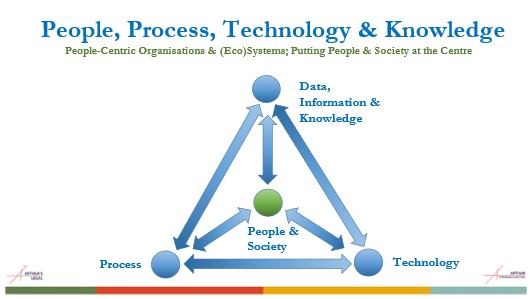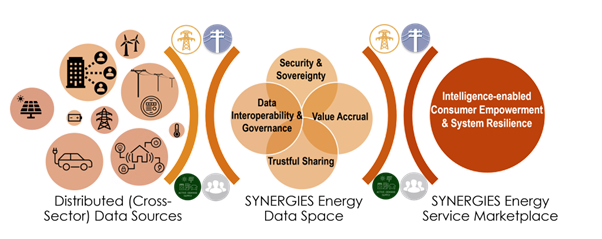Data as an Twin-Transition Enabler – PART 1

Enabling the Implementation the EU Action Plan for Digitalisation of Energy
Accountable Energy Use & Sustainable Energy, in this Digital Age
As per the rapid evolution of the geopolitical situation, nowadays we are all quite aware of the need to transforming our energy systems. This requires a holistic approach, as it encompasses environmental, societal, cultural, personal economic and technological aspects.
In the EU, (A) the ‘Fit for 55’ climate-centric green transition package, (B) the ‘Fit for the Digital Age’ people-centric digital transformation package as well as (C) the combined ‘Twin Green & Digital’ transition package, are separately and collectively addressing the various societal challenges linked to accountable energy use, energy efficiency, energy security, and the availability of affordable, sustainable energy sources, production, and storage systems, grids and distribution.
These packages put both emphasis on enabling and empowers people, planet and society at large to actively participate in the energy transition, as well as to explore where and when digitisation makes sense and can enable, achieve and sustain the objectives and targets related to Fit for 55 and Fit for the Digital Age.
The SYNERGIES Project is supporting these, in particular by shaping consumer-inclusive data pathways towards the energy transition, through a reference energy data space implementation via various pilots. Said otherwise, it focuses on (A) data, data value models, data spaces and data-enriched innovation, and (B) people-centricity, inclusiveness and societal trust, to help making this energy transition – and twin green and digital transition – possible.
 JRC published a report about key requirements than can make or break the EU’s green and digital transitions. It incluses notions about these transitions in the new geopolitical context. The related picture above is copyright of the EU
JRC published a report about key requirements than can make or break the EU’s green and digital transitions. It incluses notions about these transitions in the new geopolitical context. The related picture above is copyright of the EU
Action Plan for Digitalisation of Energy in Europe
The Twin Green and Digital Transition calls for a better-functioning, smart, integrated and interconnected energy system, where new business models can emerge in a fast-changing market. In October 2022, in addition to the emergency interventions to tackle high energy prices, the Commission adopted the Digitalising the Energy System EU Action Plan, a system-wide digitalisation energy action plan that aims to contribute to the EU energy policy objectives by supporting the development of a sustainable, (cyber)secure, transparent and competitive market for digital energy services, ensuring data privacy and sovereignty, and supporting investment in digital energy infrastructure.
The plan highlights how new technologies can help improve the efficient use of the energy resources, facilitate the integration of renewables into the grid, and save costs for EU consumers and energy companies. It further aims to ensure that digitalisation of the energy is fully part of the green energy transition in addition to being consistent with the Digital Decade 2030 objectives and targets.
- The plan's key actions to digitalise the EU's energy system are: Helping consumers increase control over their energy use and bills through new digital tools and services;
- Controlling the energy consumption of the ICT sector, including through an environmental labelling scheme for data centers, an energy label for computers and measures to increase transparency on the energy consumption of telecommunication services, and;
- Strengthening the cybersecurity of energy networks through new legislation, including a Network Code for cybersecurity aspects of cross-border electricity flows.
Data as Common Denominator
In the Digital Age, data is one of the main common denominators. It is a dynamic dimension that is relevant everywhere in this Digital Age. It is omnipresent. It can bring huge opportunities, benefits and gains. It is therefore high time that people, society and organisations in any sector start to organise themselves to grab this potential, in an European and collaborative way.
With data, information (being, structured data) and knowledge (being used information and data) finally established a such common denominator, one can place people, planet and society at the center, as set forth below in the visual.

Common European Data Spaces
In the European strategy for data (Data Strategy) that is part of the Fit for the Digital Decade package, the Commission introduces the notion of data spaces, based on the free flow of data, and aiming to enable data-driven innovation, and for once also to enable and facilitate the twin transition. Data spaces are aimed to foster ecosystems of organisations, society and persons, to creating new products, systems and services based on more accessible data with higher levels of interoperability and quality.
While data is essential for all sectors of people, planet, economy and society, each domain generally has its own specificities. Therefore regarding data spaces, the Data Strategy and related policy instruments initially will aim to support the establishment of common European data spaces in nine (9) strategic sectors and domains, in alphabetical order being:
- Agriculture data space;
- Energy data space;
- Financial data space;
- Green Deal data space;
- Health data space;
- Industrial (manufacturing) data space;
- Mobility data space;
- Public administration data space, and;
- Skills data space.
Energy Data Spaces
The term energy is mentioned 16 times in the Data Strategy. As mentioned above, the SYNERGIES Project is focused on the Energy data space, as visualised below.

It can be argued that each of the nine (9) data spaces mentioned above are linked to and quite essential for the various needs to achieve the envisioned energy transition. This, as everything – and everybody, in some kind of way – is connected, is influencing the other or otherwise interdependent.
In any case, regarding energy data space, the availability and cross-sector sharing of data, in a secure and trustworthy manner can facilitate innovative solutions and support the decarbonisation of the energy system. For this, several policy initiatives are either already under way or on the roadmap. For instance, and as non-exhaustive list, these:
- establish customer access to and portability of their meter and energy consumption data on a transparent, non-discriminatory basis, in compliance with the General Data Protection Regulation (GDPR) as well as for instance the (proposed) Data Act,
- are aimed to improving interoperability in cyber-physical systems, edge and other connected devices,
- introduce data-sharing obligations for electricity network operators, and;
- arrange for a higher level of risk-based approach,
- regarding cybersecurity by means of for instance the NIS2 Directive, Cybersecurity Act (CSA) and Resilience of Critical Entities Directive (CER), and;
- (ii) hardware/devices with digital elements and ancillary services including without limitation software with the (proposed) Cyber Resilience Act (CRA).
SYNERGIES Energy Data Space
All in all, this is a very dynamic and very necessary domain with numerous dimensions and perspectives to take into account. The SYNERGIES Project will for sure aim to contribute to these, shaping consumer-inclusive data pathways towards the energy and digital transitions with and through a reference ‘SYNERGIES Energy Data Space’ implementation, and using data as a twin-transition enabler, while also adding to bottom up policy development, and operationalising and otherwise loading of the existing and upcoming applicable regulatory frameworks where it can.
Arthur’s Legal is consortium partner of the SYNERGIES project.
